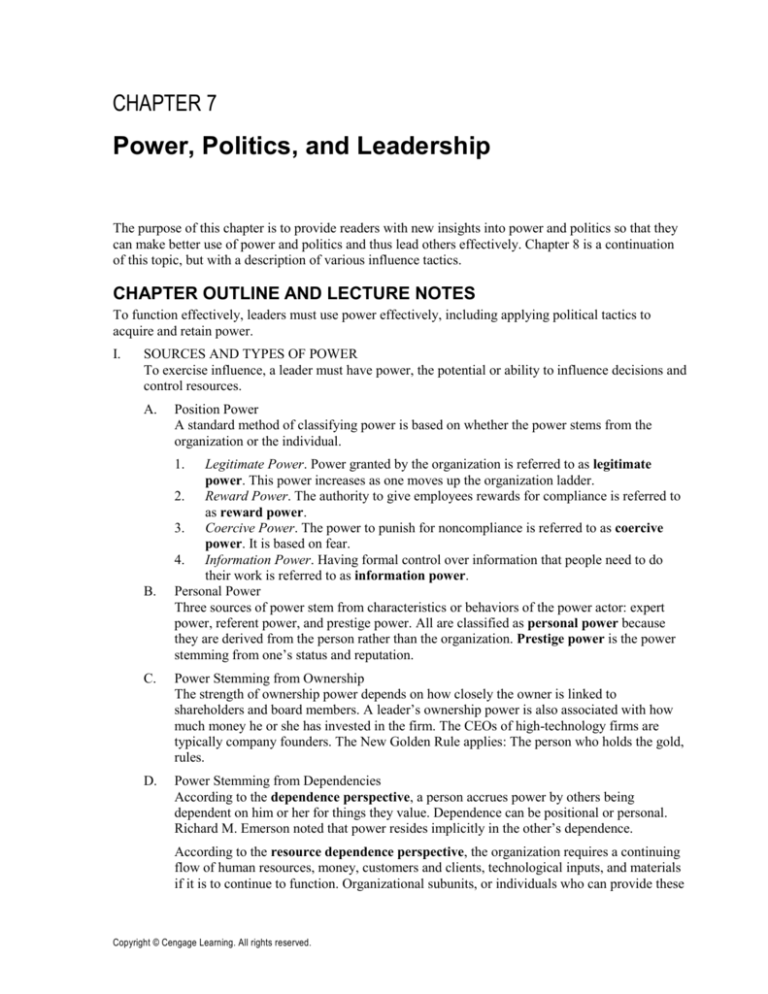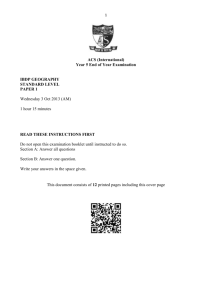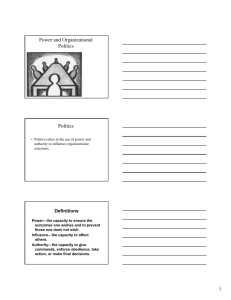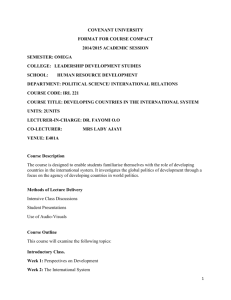
CHAPTER 7
Power, Politics, and Leadership
The purpose of this chapter is to provide readers with new insights into power and politics so that they
can make better use of power and politics and thus lead others effectively. Chapter 8 is a continuation
of this topic, but with a description of various influence tactics.
CHAPTER OUTLINE AND LECTURE NOTES
To function effectively, leaders must use power effectively, including applying political tactics to
acquire and retain power.
I.
SOURCES AND TYPES OF POWER
To exercise influence, a leader must have power, the potential or ability to influence decisions and
control resources.
A.
Position Power
A standard method of classifying power is based on whether the power stems from the
organization or the individual.
1.
B.
Legitimate Power. Power granted by the organization is referred to as legitimate
power. This power increases as one moves up the organization ladder.
2. Reward Power. The authority to give employees rewards for compliance is referred to
as reward power.
3. Coercive Power. The power to punish for noncompliance is referred to as coercive
power. It is based on fear.
4. Information Power. Having formal control over information that people need to do
their work is referred to as information power.
Personal Power
Three sources of power stem from characteristics or behaviors of the power actor: expert
power, referent power, and prestige power. All are classified as personal power because
they are derived from the person rather than the organization. Prestige power is the power
stemming from one’s status and reputation.
C.
Power Stemming from Ownership
The strength of ownership power depends on how closely the owner is linked to
shareholders and board members. A leader’s ownership power is also associated with how
much money he or she has invested in the firm. The CEOs of high-technology firms are
typically company founders. The New Golden Rule applies: The person who holds the gold,
rules.
D.
Power Stemming from Dependencies
According to the dependence perspective, a person accrues power by others being
dependent on him or her for things they value. Dependence can be positional or personal.
Richard M. Emerson noted that power resides implicitly in the other’s dependence.
According to the resource dependence perspective, the organization requires a continuing
flow of human resources, money, customers and clients, technological inputs, and materials
if it is to continue to function. Organizational subunits, or individuals who can provide these
Copyright © Cengage Learning. All rights reserved.
52
Chapter 7: Power, Politics, and Leadership
key resources, accrue power from this ability. Losing power to control resources leads to a
decline in power.
II.
E.
Power Derived from Capitalizing on Opportunity
Power can be derived from being at the right place at the right time and taking appropriate
action. You also need to have the right resources to capitalize on the opportunity. Go where
the action is to capitalize on opportunity power.
F.
Power Stemming from Managing Critical Problems
The strategic contingency theory of power suggests that those units best able to cope with
the firm’s critical problems and uncertainties acquire relatively large amounts of power.
Also, a subunit acquires power by virtue of its centrality, how much its activities are linked
into the system of organizational activities.
G.
Power Stemming from Being Close to Power
The closer a person is to power, the greater the power he or she exerts. Likewise, the higher
a unit reports in a firm’s hierarchy, the more power it possesses. Robert A. Caro reminds us
that acquiring power alone does not make for great leadership. Creating and implementing a
useful vision is also required.
TACTICS FOR BECOMING AN EMPOWERING LEADER
It is paradoxically true that power and influence increase when the leader shares power with
others. As team members receive more power, they can accomplish more. Because the manager
shares credit for their accomplishments, the manager becomes more powerful. To empower others
is to be perceived as an influential person. In a competitive environment increasingly dependent
on knowledge, the most successful organizations will be those that effectively use the talents of all
players on the team.
An advantage of empowerment from a cost perspective is that empowering workers to assume
more managerial responsibility enables the organization to get by with fewer bosses. Using
technology to communicate and help monitor work can also reduce the span of control.
A.
The Nature of Empowerment
Empowerment refers to passing decision-making responsibility from managers to group
members. One study identified four components of empowerment. Meaning is the value of a
work goal evaluated in relation to a person’s ideals or standards. A person doing meaningful
work is likely to feel empowered. Competence, or self-efficacy, is an individual’s belief in
his or her capability to perform a particular task well. Self-determination is an individual’s
feeling of having a choice in initiating and regulating actions. Choosing a method to solve a
problem leads to a high level of self-determination. Impact is the degree to which the worker
can influence strategic, administrative, or operating outcomes on the job. A fifth dimension
is internal commitment toward work goals.
B.
Empowering Practices
The practices that foster empowerment supplement standard approaches to participative
management such as conferring with group members before reaching a decision. Specific
empowering practices are described below.
1.
2.
3.
Foster Initiative and Responsibility. Encourage team members to take the initiative and
give them broader responsibility.
Link Work Activities to the Goals of the Organization. Empowerment works better
when the empowered activities are aligned with the strategic goals of the organization.
Provide Ample Information. Give employees ample information about everything that
affects their work. This is the basis of open-book management.
Copyright © Cengage Learning. All rights reserved.
Chapter 7: Power, Politics, and Leadership
53
4.
C.
Allow Group Members to Choose Methods. Explain to the individual or group what
needs to be done and let the people involved choose the method. Also explain why the
task needs to be done.
5. Encourage Self-Leadership. Encourage team members to practice self-leadership
because it is the heart of empowerment. The basic idea of self-leadership is that all
organizational members are capable of leading themselves at least to some extent.
When employees lead themselves, they feel empowered.
6. Establish Limits to Empowerment. To prevent dysfunction, workers need a clear
perception of the boundaries to empowerment.
7. Continue to Lead. Although the leader empowers group members, the leader should
still provide guidance, emotional support, and recognition.
8. Cultural Differences. Cross-cultural factors influence empowerment, such as a study of
a single firm with operations in the United States, Mexico, Poland, and India. Among
Indian workers, empowerment lowered job satisfaction.
Effective Delegation and Empowerment
A major contributor to empowerment is delegation, the assignment to another person of
formal authority and responsibility for accomplishing a specific task. Delegation is narrower
than empowerment because it relates to a specific task. Delegation can be motivational
because it offers group members the opportunity to develop their skills and demonstrate their
competence.
III. FACTORS THAT CONTRIBUTE TO ORGANIZATIONAL POLITICS
Organizational politics refers to informal approaches to gaining power through means other than
merit or luck. Views of organizational politics are becoming increasingly positive, such as
“Political skill is an interpersonal style that combines social awareness with the ability to
communicate well.” However, many people continue to view organizational politics as being
negative. Contributing factors to politics are as follows:
A.
Pyramid-Shaped Organization Structure
The pyramid-shaped organization structure fosters a power chase because a pyramid
concentrates power at the top and leads to competition for limited resources.
B.
Subjective Standards of Performance
Subjective standards of performance foster political behavior. People often resort to
organizational politics because they do not believe that the organization has an objective and
fair way of judging their performance and promotability.
C.
Environmental Uncertainty and Turbulence
Environmental uncertainty and turbulence fosters politics because when people operate in an
unstable and unpredictable environment, they tend to behave politically. It is difficult to
specify what people should be doing in an uncertain situation.
D.
Emotional Insecurity
Emotional insecurity can lead to political behavior as people attempt to ingratiate themselves
with superiors because they lack confidence in their talent and skills.
E.
Machiavellian Tendencies
Machiavellian tendencies represent a fundamental reason why people engage in politics.
People who are Machiavellian have a propensity to behave politically.
Encouraging Admiration from Subordinates
Encouraging admiration form subordinates often takes place because the manager sends out
subtle signals that they want praise, such as smiling after receiving a compliment. Also,
admirers are more likely to receive good assignments and high performance standards.
F.
Copyright © Cengage Learning. All rights reserved.
54
Chapter 7: Power, Politics, and Leadership
IV. POLITICAL TACTICS AND STRATEGIES
To make effective use of organizational politics, leaders must be aware of specific political tactics
and strategies. Here we offer a representative group of political tactics and strategies categorized
as ethical versus unethical. Many of the influence tactics to be described in Chapter 8 can also be
considered political.
A.
Ethical Political Tactics and Strategies
Ethical political methods are placed into three related groups: those aimed directly at gaining
power, those aimed at building relationships with superiors and coworkers, and those aimed
at avoiding political blunders. All of these tactics help the leader gain or retain power, and
they help the leader succeed in and manage a stressful work environment.
1.
B.
V.
Strategies and Tactics Aimed at Gaining Power. As Tom Peters notes, the slow and
steady (and subtle) amassing of power is the surest road to success. The following
seven techniques help a person gain power directly: (a) develop power contacts, (b)
control vital information, (c) control lines of communication, (d) do what the political
environment demands, (e) bring in outside experts, (f) make a quick showing—a quick
display of dramatic results can lead to acceptance of future proposals, (g) remember
that everyone expects to be paid back, (h) be politically correct, and (i) be the first to
accept reasonable changes.
2. Strategies and Tactics Aimed at Building Relationships. Much of organizational
politics involves building positive relationships with network members who can be
helpful now or later. Several representative strategies and tactics follow: (a) display
loyalty; (b) manage your impression; (c) ask satisfied customers to contact your boss;
(d) be courteous, pleasant, and positive; (e) ask advice—show your trust in the other
person’s judgment; (f) send thank-you notes to large numbers of people; and (g) flatter
others sensibly.
3. Strategies Aimed at Avoiding Political Blunders. A strategy for retaining power is to
refrain from making power-eroding blunders. Some of these key blunders are (a)
criticizing the boss in a public forum, (b) bypassing the boss, (c) declining an offer
from top management, (d) putting your foot in your mouth, (e) not conforming to the
company dress code, and (f) writing embarrassing or incriminating e-mail messages.
Unethical Political Tactics and Strategies
Any political tactic might be considered unethical if it is carried to extremes. These
approaches, however, are unequivocally unethical: (a) back stabbing, (b) embrace or
demolish (take no prisoners), (c) set a person up for failure, (d) divide and rule (have
subordinates fight among themselves, therefore giving you the balance of power), (e)
playing territorial games, and (f) creating then resolving a false catastrophe.
EXERCISING CONTROL OVER DYSFUNCTIONAL POLITICS
Carried to excess, organizational politics can hurt an organization and its members. A study
showed that the presence of political behavior can lead to lowered commitment and a stronger
turnover intention. Also, people who dislike politics will suffer from lowered morale.
A comprehensive strategy to control politics is for leaders to be aware of its causes and
techniques. Open communication can also help minimize politicking. Avoiding favoritism and
cronyism is a major way of reducing politics. Setting good examples at the top may reduce the
frequency and intensity of politics. Goal congruence between the individual and the organization
helps. Politics can sometimes be constrained by threatening to discuss questionable information in
a public forum. Hiring people with integrity helps reduce dysfunctional politics.
Copyright © Cengage Learning. All rights reserved.
Chapter 7: Power, Politics, and Leadership
55
VI. GUIDELINES FOR ACTION AND SKILL DEVELOPMENT
To enhance your interpersonal effectiveness at the outset of joining a firm, it is helpful to size up
the political climate. Ask diagnostic questions such as (1) What method do people use here to
offer new ideas? (2) How much personal reference is tolerated? (3) Who gets heard? Promoted?
Passed over?
COMMENTS ON EXPERIENTIAL EXERCISES
Manager Assessment Quiz 7-1: Rating a Manager’s Power
To conduct this power rating, students might rate a present or past immediate manager. An issue worth
exploring is whether this issue is subject to the halo effect. There might be a tendency to rate a leader
high on many characteristics just because he or she is well liked.
Leadership Self-Assessment Quiz 7-2: Becoming an Empowering
Manager
This brief quiz offers the advantage of focusing the students’ attention on the importance of attitudes
and behaviors tied to empowerment. The behaviors are also associated with good supervision and
management in general.
Leadership Skill-Building Exercise 7-1: Conducting an
Empowerment Session
A potential contribution of these role-plays is that they illustrate the importance of leadership input in
the empowerment process. In both scenarios the leader will have to discuss mutual expectations. In the
second scenario the task may be more difficult because the proprietors are looking more for directive
leadership than to be empowered.
Leadership Self-Assessment Quiz 7-3: The Positive Organizational
Politics Questionnaire
An advantage of this questionnaire is that it focuses on the use of positive political tactics. The quiz also
gives students the opportunity to reflect on the link between using political tactics and acquiring power.
The skill-development portion of the quiz suggests that being overly political can backfire.
Leadership Skill-Building Exercise 7-2: The Flattery Role-Play
Count on students to perform admirably in this role play. The role players will find that being able to
flatter others in a natural, effective way is a skill that requires development. The airport scenario is a
good one because so often we have so little time to connect with key people.
Leadership Skill-Building Exercise 7-3: Controlling Office Politics
Although the subject is dealing with the control of impression management techniques, this exercise is
also useful for practicing conflict-resolution skills. A subtle advantage of this exercise is that it
reinforces the importance of controlling excessive politics.
Copyright © Cengage Learning. All rights reserved.
56
Chapter 7: Power, Politics, and Leadership
COMMENTS ON DISCUSSION QUESTIONS AND ACTIVITIES
1.
Why do so many people think possessing power is a good thing?
Power in most cultures is something of inherent value like health, love, sex, and money. Power is
also valued because it brings people status, along with many other desirable things such as money,
friends, and leisure activities of choice. For many people, power is a natural reinforcer.
2.
How can a leader occupy a top-level executive position and still have relatively little power?
A low-power executive could be one who has so little expert power that his or her advice is not
taken seriously. The person might also be a political appointment who is given very few formal
responsibilities.
3.
Contrary to popular opinion, CEOs of major U.S. companies come from a wide variety of private
universities and state universities, not just a handful of well-publicized MBA programs. What
does this fact tell you about sources of power and organizational politics?
The general picture here is that power can stem from a variety of sources including expertise and
reputation. You can eventually hold an executive position by acquiring power in a number of
ways and not relying so heavily on the prestige of your business program or the contacts you
make among classmates. A healthy perspective here is that the acquisition of power in business
has become more democratic, and less lined to elitism.
4.
What can you do this week to enhance your power?
An approach that might work for many students is to look to make one useful contact, such as
befriending an influential person in a professional group, or a fellow student with above-average
potential. Studying, to enhance expert power, is another accessible method.
5.
Many business leaders say something to the effect, “We practice empowerment because we don’t
expect our employees to leave their brains at the door.” What are these leaders talking about?
The expression, “leave their brains at the door” implies that after workers enter the workplace,
they no longer think and follow procedures with any creative thought. In empowerment, workers
are expected to find solutions to problems themselves.
6.
Empowerment has been criticized because it leaves no one in particular accountable for results.
What is your opinion of this criticism?
Elliot Jacques, who made this statement, is correct that empowerment can create a loose
organization. A possible antidote is to hold the team—and the team leader—accountable for
results. In practice, the team leader often assumes many of the responsibilities formerly assumed
by the unit manager.
7.
Why are entrepreneurial leaders often poor delegators?
Entrepreneurial leaders are often poor delegators because they have created their enterprise and
are familiar with many of the details of the operation. It is difficult for them to let go and watch
somebody else perform the same tasks. Also, entrepreneurs often have so much emotional and
financial involvement in the company that they worry excessively about somebody else making a
mistake. This attitude interferes with delegation.
8.
Many people have asked the question “Isn’t office politics just for incompetents?” What is your
answer to this question?
Many competent and talented people must use organizational politics to gain the resources, and
make the contacts they need to accomplish their mission. Good job performance alone is often not
Copyright © Cengage Learning. All rights reserved.
Chapter 7: Power, Politics, and Leadership
57
sufficient to acquire enough power to achieve laudable ends, such as getting a large enough
budget to launch a meritorious project.
9.
A woman who is a CEO fires thousands of people and closes many units of the organization.
Which is the best label for her in terms of political correctness: hatchet man, hatchet woman, or
hatchet person? Explain your position.
Here is one of the few instances in which using the male reference term has stuck. The woman
executive who slashes jobs is therefore a hatchet man. Yet political correctness would suggest that
we call the woman a hatchet person or perhaps a hatchet woman. Being a hatchet person is the
most neutral because it does not imply that either a man or woman is the meaner of the two.
10. Ask an experienced worker to give you an example of the successful application of organizational
politics. Which tactic was used and what was the outcome?
The information gathered in response to this question should be illuminating. A modal answer is
likely to be the use of ethical politics to form alliances with a powerful person, and then cashing in
on that contact in the future. For example, a middle manager may have found a summer internship
for an executive’s daughter. Later when the middle manager needs authorization for a pilot project
on a new service, the manager has a highly-placed ally.
PLAUSIBLE RESPONSES TO CASE QUESTIONS
Leadership Case Problem A: Kimberly Davis Dances Around
Mergers
The case history is useful in illustrating how political tactics can help a person survive and advance
within his or her career.
1.
Identify several political tactics Davis used to come out ahead after mergers.
Displaying her expertise in marketing and finance was a starting point for Davis. She used her
expertise to impress the right people. Capitalizing on her contact with the head of human
resources was another important political tactic. Davis also deftly aligned herself with people in
power.
2.
Identify the sources of power Davis used to enhance her career.
Davis relied heavily on expert power in the form of knowledge of marketing and finance to gain
recognition. Being close to power was another power source for Davis because she capitalized on
her contact with a powerful head of human resources.
3.
What is your evaluation of the ethics Davis displays?
The tactics revealed in this story about Davis appear to be ethical. Tactics such as sizing up the
environment and capitalizing on a contact would be classified as ethical by most observers.
4.
What career advice might you offer Davis?
Davis is a highly political person so she has to guard against being perceived as too political by
key organizational members. If she comes to be perceived as overly concerned about her career
advancement—and not concerned enough about the organization—she might be perceived
negatively.
Copyright © Cengage Learning. All rights reserved.
58
Chapter 7: Power, Politics, and Leadership
Leadership Case Problem B: Empowerment at Direct Mail Inc.
This case about empowerment at a relatively small retailer illustrates some of the practical problems
involved in empowerment.
1.
What advice can you offer Parker about his approach to empowerment?
If the feedback from subordinates is accurate, Parker needs to look for instances in which he can
make empowerment and delegation more complete.
2.
To what extent is Valentine committing a political blunder in telling her boss that he is a yo-yo
delegator?
With an insecure boss, telling him or her that he or she is a yo-yo delegator could damage the
relationship between the subordinate and boss. At Direct Mail, the direct reports appear to have a
good relationship with Dennis Parker, allowing for such frank discussion.
3.
What is your evaluation of the corporate social responsibility of a direct mail business considering
that probably over 95 percent of recipients of the mailings throw them away immediately?
The easy argument here is that a direct mail business is socially irresponsible because the mailings
waste so much paper, energy, and might help clog landfills. The counterargument is that a direct
mail business does some social good. The company creates jobs for its own employees, helps its
customers stay in business thereby preserving jobs, and also creates business for printers thereby
preserving even more jobs. Furthermore, without direct mailers (including newspaper inserts) the
U. S. Postal Service and newspaper companies would have to shrink their workforces.
Copyright © Cengage Learning. All rights reserved.









